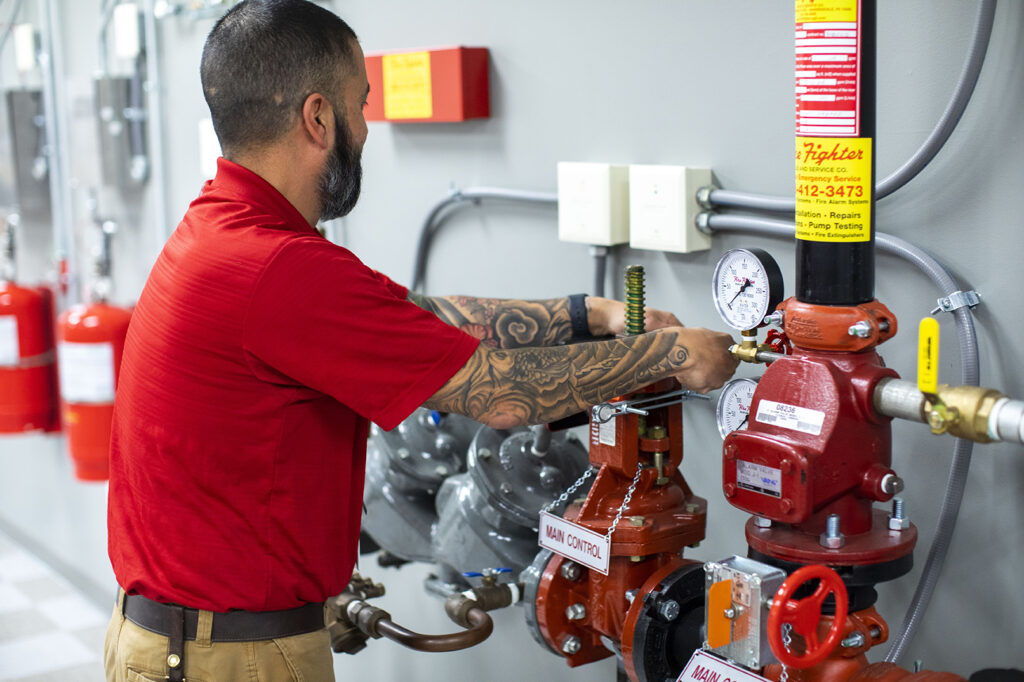Marine operations face unique risks, and fire is one of the most significant threats aboard ships and offshore installations. Engine rooms, control rooms, generator compartments, and tanker areas are particularly vulnerable. A fire on board not only endangers lives but can also lead to significant operational disruptions and financial losses. Prioritising safety through advanced Marine Fire Fighting & Fire Suppression Systems is critical for safeguarding vessels, protecting crew members, and ensuring business continuity. These systems provide proactive solutions that detect, control, and extinguish fires efficiently before they escalate into catastrophic incidents.
Understanding Marine Fire Risks
Ships and offshore facilities operate in environments where fire hazards are constant. Engine rooms contain highly combustible fuels and lubricants, while electrical systems and machinery create the potential for sparks or overheating. Tanker operations involve the handling of flammable liquids, further elevating fire risk. Even minor errors, such as human mistakes during maintenance or improper storage of combustible materials, can trigger fires.
Statistics from maritime safety reports indicate that fires remain a leading cause of vessel damage and operational delays. These figures highlight the urgent need for robust safety measures. Understanding these risks allows vessel owners and operators to make informed decisions about deploying Marine Fire Fighting & Fire Suppression Systems that are tailored to their specific operational environment.
What Are Marine Fire Fighting & Fire Suppression Systems?
Marine Fire Fighting & Fire Suppression Systems are advanced solutions designed to detect and combat fires in maritime settings. Unlike standard fire safety systems, these systems are engineered to withstand the challenges of the marine environment, including vibration, corrosion, and exposure to harsh weather conditions.
These systems typically include smoke and heat detectors, control panels, alarms, and suppression agents, all integrated to provide comprehensive protection. Once a fire is detected, the system can automatically activate, releasing suppression agents to control and extinguish the flames. The goal is to prevent fire spread, minimize damage, and ensure the safety of personnel and assets.
Types of Marine Fire Suppression Systems
Marine vessels and offshore platforms require specialised fire suppression systems to address different types of fire hazards. The most commonly used systems include:
Gas-Based Systems: Gas-based Marine Fire Fighting & Fire Suppression Systems use agents like FM-200 or Novec 1230 to suppress fires without causing damage to sensitive equipment. These systems are ideal for control rooms, server rooms, and areas containing electronic equipment. They act quickly by removing heat or oxygen, effectively halting the fire.
Water Mist Systems: Water mist systems deploy fine water sprays that absorb heat and displace oxygen around the fire. These systems are highly effective in engine rooms and enclosed spaces where water damage needs to be minimal. Water mist systems provide rapid cooling and fire suppression without flooding the compartment.
Foam Suppression Systems: Foam-based systems are particularly suitable for flammable liquid fires, such as those in fuel storage tanks and tanker decks. The foam forms a blanket over the fuel surface, cutting off oxygen and preventing re-ignition.
Hybrid Systems: Hybrid systems combine multiple suppression agents to deliver comprehensive protection across different areas of the vessel. They integrate the rapid suppression of gas systems with the cooling capabilities of water mist or foam systems.
A comparison of these systems highlights the need for tailored solutions that match the specific risks and operational requirements of each vessel.
Benefits of Installing Marine Fire Suppression Systems
Deploying Marine Fire Fighting & Fire Suppression Systems offers numerous advantages that extend beyond immediate fire control.
- Rapid Detection and Response: Advanced sensors detect smoke, heat, or flame quickly, triggering an automated response that prevents fire escalation.
- Minimized Damage: Suppression agents act swiftly, reducing the potential for structural damage, equipment loss, and costly repairs.
- Enhanced Crew Safety: Fire suppression systems protect personnel by controlling fire spread, ensuring safe evacuation routes, and reducing exposure to smoke and heat.
- Regulatory Compliance: Modern marine fire suppression systems meet SOLAS, IMO, and other maritime safety standards, ensuring legal compliance and operational credibility.
- Operational Continuity: By minimizing downtime due to fire incidents, vessels can maintain schedules and avoid costly disruptions.
These benefits underscore why investing in advanced Marine Fire Fighting & Fire Suppression Systems is not just a safety measure but a strategic operational decision.
Maintenance & Testing of Marine Fire Suppression Systems
Regular maintenance and testing are essential to ensure the reliability of Marine Fire Fighting & Fire Suppression Systems. Over time, environmental factors such as humidity, saltwater exposure, and vibration can affect system performance. Scheduled inspections help identify worn components, leaks, or calibration issues before they compromise system functionality.
Fire Alarm Detector Testers play a critical role in maintenance. These certified tools allow technicians to simulate fire scenarios, verify detector sensitivity, and ensure the system triggers accurately. Testing procedures typically include visual inspections, functional testing of alarms and control panels, and verification of suppression agent delivery. Proper documentation of maintenance activities also ensures compliance with regulatory requirements and enhances safety assurance.
Atlas Technologies Corporation’s Role in Marine Fire Safety
Atlas Technologies Corporation is a trusted provider of Marine Fire Fighting & Fire Suppression Systems, offering tailored solutions for maritime and offshore clients. With years of expertise, Atlas delivers systems designed to meet the stringent demands of marine operations. Their services include risk assessment, system design, installation, and ongoing maintenance to ensure vessels remain protected at all times.
Case studies of Atlas installations demonstrate successful fire prevention and mitigation in high-risk environments, reflecting the company’s commitment to safety, reliability, and innovation. By partnering with Atlas Technologies Corporation, vessel operators gain access to advanced technologies, expert support, and customised solutions that align with their unique operational needs.
Future of Marine Fire Fighting
The future of Marine Fire Fighting & Fire Suppression Systems is moving toward smarter, more integrated solutions. Emerging technologies include IoT-enabled monitoring, AI-driven detection, and predictive maintenance systems. These innovations allow operators to anticipate risks, monitor system performance in real time, and respond proactively to potential hazards.
Sustainable and eco-friendly suppression agents are also becoming more prevalent, reducing environmental impact without compromising effectiveness. As technology evolves, maritime fire safety solutions will become more intelligent, responsive, and efficient, ensuring vessels are better protected than ever before.
Takeaway
Protecting ships and offshore installations from fire hazards requires a proactive, reliable, and technologically advanced approach. Marine Fire Fighting & Fire Suppression Systems provide that essential protection, combining rapid detection, effective suppression, and regulatory compliance. By investing in these systems, vessel operators ensure the safety of their crew, the integrity of their assets, and the continuity of their operations. Companies like Atlas Technologies Corporation make this possible by delivering expert, customised solutions that meet the evolving demands of maritime safety.
FAQs — Marine Fire Fighting & Fire Suppression Systems
How do Marine Fire Fighting & Fire Suppression Systems work?
These systems detect fire through smoke, heat, or flame sensors and activate suppression agents to control and extinguish the fire automatically.
What is the best fire suppression system for ships?
The ideal system depends on the vessel type and hazard areas. Gas-based systems are suited for sensitive electronic spaces, while foam or water mist systems are better for fuel storage and engine rooms.
How often should marine fire systems be tested?
Systems should undergo regular inspections and functional tests, typically every six months, with annual comprehensive evaluations to ensure full compliance and reliability.
Can marine fire suppression systems be customised for unique vessels?
Yes. Companies like Atlas Technologies Corporation design customised solutions to meet the specific needs and operational conditions of each vessel.
Why are Marine Fire Fighting & Fire Suppression Systems critical for maritime operations?
They safeguard lives, protect assets, ensure operational continuity, and comply with international maritime safety regulations, making them indispensable for modern marine operations.











